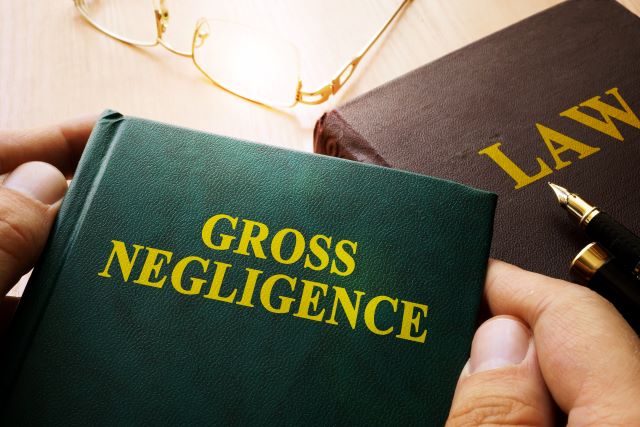The elements of negligence are critical to every personal injury claim. For accident victims to win their case, they must establish proof of every part of a personal injury offense. Of course, the first step to proving a case is understanding the different elements and what they mean. Our Las Vegas personal injury attorneys explain.
GET YOUR FREE PERSONAL INJURY ACCIDENT CONSULTATION
NO FEES UNLESS WE WIN!
The Four Elements of Negligence
The Nevada elements of negligence are:
- Duty – The defendant owed a duty of reasonable care to the victim.
- Breach of Duty – The defendant failed to live up to the standard of a reasonable person. They acted unreasonably based on the level of care of an ordinary person.
- Causation – An accident occurred. The victim suffered harm because of the breach of duty of care.
- Damages – The victim s has personal injury, property damage or both.
What Is Negligence in Nevada?
Negligence in Nevada is a failure to live up a duty of ordinary care.
First, it means that a person has an obligation to act with reasonable caution.
Then, the person fails to live up to the standard of ordinary care. To determine whether actions are negligent, compare the actions of the individual or party to what an ordinary, reasonable person should have done in the same situation.
If the person’s actions are not up to the minimum standard of a reasonable amount of care, the actions are negligent in Nevada.

Proving Negligence in Nevada
Proving negligence in Nevada involves gathering evidence of each element of negligence. Begin by establishing that the defendant had a duty to the victim. Sometimes, a duty is based on the relationship between the parties. Other times it may not be as clear. Then, show how the victim did not live up to their duty of care.
The victim must present evidence of what the defendant did, along with proof that their actions were unreasonable based on the standard of an ordinary, reasonable person. Finally, to prove negligence in Nevada, demonstrate that an accident occurred and what damage resulted.
What Is the Statute of Limitations for Negligence in Nevada?
The statute of limitations for negligence in Nevada is two years. The limit is three years for personal property. There may be exceptions for minors and cases where the victim is not immediately aware of their injuries. The Nevada Statute of Limitations for negligence is found in NRS 11.190.
How Do You Determine the Duty of Care?
To determine the duty of care, look at the entire set of circumstances present in the case. Then consider how a person of reasonable, ordinary care should behave in the same situation. A person has to live up to a minimum of reasonable care. They don’t have to go beyond that standard. Also, determining the duty of care doesn’t involve looking at hindsight. Instead, it’s about looking at what amounts to basic, reasonable behavior in a given situation.
To determine the duty of care, ask some of these questions:
- How likely was it that the person’s course of action could result in harm?
- What information did the person have available to them at the time events unfolded?
- Did the person have a special duty to the victim because the victim was a customer or there was a caregiving relationship?
- Was the harm that occurred foreseeable?
- How does society look at the actions of the person? Were their actions acceptable?
What Is Causation in Legal Terms?
In legal terms, causation is when something happens as a result of something else. It means that something happened because another thing happened first. An incident can be the direct cause of something else happening, or there may be multiple factors in play. Causation is when one event or series of events leads to other events. There is usually an element of foreseeability between the actions and the results that occur.

What Are Damages in Personal Injury?
Damages in personal injury are the losses that a person suffers because of someone else’s legal wrongdoing. Damages are all of the ways that a person is harmed because they are the victim of an accident. In personal injury, there may be economic damages or non-economic damages, like pain and suffering. Damages may include property damage as well.
When you’re evaluating a duty of care, remember that the actor must live up to the minimum standard. It’s not the same as looking at the situation in retrospect for any way the accident could have been avoided. Instead, the question is whether the person did as much or more than a reasonable person would have done in the same set of circumstances.
Example of a Case Evaluating Negligence
One Nevada case that evaluates negligence is the 2008 case of Turner v. Mandalay Sports Entertainment. The case involves the minor league baseball team, the Las Vegas 51s (now known as the Las Vegas Aviators). The victim was a season ticket holder.
The victim left her seat to go to the beer garden. There, she was hit in the face by a foul ball. It knocked her unconscious and broke her nose.
The baseball team printed disclaimers on their tickets, warning people about foul balls. In addition, the game announcer made warnings. There were also warning signs posted. However, there were no protective screens around the beer garden to prevent foul balls from traveling into the area.
In the Turner case, the court adopted the limited duty rule for negligence cases. The court said that it’s possible for a business owner to have less than a full duty of care in some circumstances. The court noted that it was essential to look at the case in relation to the broader assumption of the risk involved with going to a baseball game. The court decided that the baseball team acted reasonably because only the occasional foul ball went into the beer garden, and no other spectator suffered injuries like the victim. The court looked at all of the facts and circumstances to decide the duty of care and negligence.
Las Vegas Attorneys for Negligence Cases
Are you wondering if negligence occurred in your case? Do you have questions about the duty of care in personal injury cases? Contact our Las Vegas attorneys for negligence cases today for a free consultation.
Call (702) 382-0000 For a Free Consultation
Areas We Service in Las Vegas, Nevada
Henderson | Anthem | Summerlin | Paradise | Summerlin North | Summerlin South | Sunrise Manor | Nellis AFB | Desert Shores | Downtown South | Charleston | Richfield | Crestwood | Angel Park Ranch | Queensridge | Casa Grande Pines | Winchester |
Adam S. Kutner reviews and testimonials
“I needed an attorney because I couldn’t deal with the accident on my own, so I needed someone else’s opinion about my accident.
Well I heard about Adam Kutner through an associate of mine and I chose to seek him because I heard of him before also, so I thought he would be the best option for me.
I was very happy with my settlement and it came quicker than I thought, in just a couple months I received a check in the mail.
When I recommend Adam Kutner I would tell them that the settlement comes very quickly, and he is very helpful with transportation and whatever else you may need.”
– Deborah Banks. 5/5 Stars
START YOUR FREE CONSULTATION
NO FEES UNLESS WE WIN!
SE HABLA ESPAÑOL
Call Now! Free Consultation!

Adam S. Kutner
PERSONAL INJURY LAWYER
With more than 34 years of experience fighting for victims of personal injury in the Las Vegas Valley, attorney Adam S. Kutner knows his way around the Nevada court system and how to get clients their settlement promptly and trouble-free.













